Film Reviews by Patrick D. Anderson, professor of Humanities
Professor Anderson teaches, and has a great passion for, film. Read about some of his recent picks, ranging from popular to lesser known gems.

Michael Clayton
In the first film directed by Tony Gilroy (seasoned screenwriter of the three “Bourne” movies, "Extreme Measures" and “The Devil's Advocate), George Clooney plays Michael Clayton, the “fixer” at a see him stop his Mercedes in the early morning on a country road, climb up a gentle hill and watch three horses elegantly standing in a field. This is a rare quiet moment in a film filled with the mounting tension and dark intrigue that typifies corporate thrillers like this one, which is in the tradition of such classics as “Wall Street,” “Serpico” and “The Verdict,” although the action isn't as fast-paced as we might expect since the film is more about character development than cloak-and-dagger plot twists.
In playing Michael Clayton, Clooney takes on another role, like those in “Syriana” and “Good Night and Good Luck”, in which he must struggle with moral issues and exhibit depths of character we might not have expected from the actor who once starred as Batman and has padded his bank account by playing Danny Ocean too many times. In this latest role, however, he goes beyond mere glamour and charm to become what he calls the firm's “janitor”—a dutiful employee who simply does his best to fulfill his assignments, not the “miracle worker” his clients (and his bosses) hope he will be. And while the ending may seem a bit contrived, the film's overall excellence rests on how effectively Clooney reveals the various facets of his character as he simply goes about doing his job.
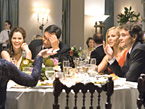
The Jane Austen Book Club
The structure of this film couldn't be simpler: six book club members read six Jane Austen novels over a six-month period, and in the process they begin to figure out the complications of their own lives in present-day Sacramento. While the environment they live in couldn't be more different from Austen's early 19th- century England—in the opening credit sequence we see the characters simply trying to survive the frenzied high-tech pace of daily existence—the myriad relationship issues they face clearly mirror those in the books they begin to read.
The book club itself begins when Kathy Baker's character Bernadette suggests that it might provide a good diversion for her friend Jocelyn (Maria Bello) who is trying to get over the death of her most beloved companion, which just happens to be her dog—a Rhodesian ridgeback. Of course, Bernadette has had relationship problems of her own, having been married six times already. She thinks reading Austen might also benefit her friend Sylvia (Amy Brenneman), who has just learned that her husband, Daniel (Jimmy Smits) is leaving her for a co-worker. Their free-spirited (and gay) daughter, Allegra (Maggie Grace), is also in the group along with the much more conservative Prudie, a young French teacher played by Emily Blunt, whose husband cancels their planned trip to Paris so he can take a client to some NBA games. Rounding out the sextet is the only male member, Grigg (Hugh Dancy), whom Jocelyn invites to join with the hope that he'll start dating Bernadette.
It's an impressive directorial debut for writer Robin Swicord (who also did the scripts for “Memoirs of a Geisha,” “Little Women” and “The Perez Family”). Its engaging story line, its likeable characters and its evolving relationships provide the same sort of comfort you get from reading a Jane Austen novel, though you don't have to know her work to enjoy the film. But like “Pride and Prejudice,” “Sense and Sensibility” and the other works this book club reads, the film offers a familiar sort of routine which it's easy to fall into. So while there's nothing cinematically spectacular or narratively surprising about the film, there doesn't need to be: rather, it's an enjoyable adult story filled with people you like spending time with—and if it leads some moviegoers back to Jane Austen (or to discover her work for the first time, perhaps), that's just icing on the cake.
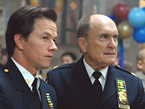
We Own the Night
The time is 1988, when the NYPD had the slogan “We Own the Night” painted on the sides of their patrol cars. In this film, the cops try to take back a portion of the night from the drug dealers—a theme we've seen more than once—with two brothers on either side of the law—something we've also seen before.
Last year's "The Departed" won an Oscar for Martin Scorcese for mining much of the same territory, albeit in Boston. The mobsters controlling the drug scene here are Russians—which recalls the recently released David Cronenberg film "Eastern Promises," though that is set in London. Director James Gray has trod some of this same ground himself in his earlier crime films, Little Odessa and The Yards. And because "The Yards" also starred Joaquin Phoenix and Mark Wahlberg, it's no wonder these similarities jump to the forefront.
The two brothers at the heart of this film couldn't be more different: Wahlberg's Joseph Grusinsky is a middle-class straight arrow who, in one of the opening scenes, is being honored for his civic service, the pride and joy of his father, Chief of Police Burt Grusinsky, (played by Robert Duvall), while Phoenix's Bobby Green, with an earring in one ear and the gorgeous Amada Juarez (Eva Mendes) at his side, is the slick but volatile manager for a huge, popular club owned by a kindly, grandfatherly figure who, it turns out, is smuggling drugs on the fake fur of imported sable coats. His dealer is his nephew Vadim Nezhinski (Alex Veadov), who frequents Bobby's club and offers him the opportunity to get in on his illegal, highly lucrative business. This occurs just as the police force decides to make a move on Nezhinski, with a raid on the club, an action spearheaded by Joseph. And here the plot thickens.
Shortly after Joseph's strong-arm tactics at Bobby's club, he's gunned down and left for dead in front of his house the night before Thanksgiving. Although Joseph recovers, his near-death experience makes his brother reconsider what he's doing at the club and, much more quickly than seems plausible, he's signing on to lead the cops to the drug kingpin, by infiltrating their headquarters. The perfect plan they devise goes awry, of course, and much of the rest of the film follows Bobby—and the rest of his family—as they attempt to elude the vendetta of the Russian mob. Most memorable of the confrontations between the forces of good and evil is a car chase in the rain on a busy New York City bridge, where nothing goes as expected, except the kinetic cinematography which provides a visceral adrenalin rush for the viewer.
While much of the storyline feels derivative, the performances of Phoenix and Mendes are noteworthy. Phoenix must exhibit a range of attitudes and emotions, from preening player at the club to remorseful family member at his brother's hospital bed to a man frustrated at being confined to an anonymous motel room with police protection. When first introduced on a couch in the back room of Bobby's club, Mendes' character Amada appears to be just another sleazy conquest eager for the manager's attentions. But she proves herself to have much greater depth than first expected, as the love she shows for both Bobby and her mother enlarge our understanding and appreciation for this woman who hasn't had many breaks in life but continues to exhibit compassion and understanding for those around her.
If you don't ask too many questions about the world you're entering when you watch the film, but enjoy the solid acting and some of the high intensity sequences (including the car chase and the visit to the Russian drug headquarters where Bobby's character is exposed), the film delivers. So while it may not be the most original film to tackle the topic, it has enough going for it that it held my attention for two hours.
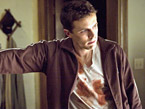
Gone Baby Gone
For his first film as director, Ben Affleck has chosen wisely, co-writing the screenplay, with Aaron Stockard, based on a novel by Dennis Lehane (author of Mystic River) which is also set in Boston, hometown for Affleck and his younger brother Casey, who stars as private investigator Patrick Kenzie. The seedier sections of the city, and the down-on-their luck types who live there, play a major role here as they did in Clint Eastwood's Oscar-winning film of a few years ago.
On one level, this is a police drama, as the Boston Police Department try to figure out what happened to four-year old Amanda McCready who was abducted from her bedroom while her mother, Helene (Amy Ryan), a sleazy alcohol and drug abuser, was away from the house. Since Amanda's aunt, Bea McCready (fiercely played by Amy Madigan) doesn't think the cops are doing all they should be, she hires Kenzie and his associate (and girlfriend) Angie Gennaro (Michelle Monaghan) to try to uncover any local angles since they do, after all, live there.
Ben Affleck puts us in this neighborhood in the opening credits with shots of the people and places and streets and activities which define this rundown locale—a locale which Patrick Kenzie must explore if he's to uncover any leads which the cops may have overlooked. In light of the seemingly youthful innocence of both Kenzie and Gennaro, they aren't given much credibility. But this is also a strength for them since they're open to possibilities the jaded cops have simply ignored or don't even want to consider. The crime seems to be resolved about halfway through, so you know there are more developments to come. And it's a tribute to the effectiveness of the script—and the acting of the fine ensemble cast, which includes Morgan Freeman as the chief detective and Ed Harris and John Ashton as Freeman's right-hand associates—that the plot twists which evolve are quite convincing even as they surprise us.
Like "Mystic River," "Gone Baby Gone" raises a number of thought-provoking, morally complex questions—about a range of subjects, including parenting, pedophilia, justice, and doing the right thing—or, for that matter, trying to determine what the right thing may be. It's an auspicious start for Ben Affleck as a director and a confirmation that his kid brother Casey has come into his own as an actor, especially when you consider that in his previous film—released just a few weeks ago—he stole the spotlight from Brad Pitt in a story about the man who killed Jesse James.

Into the Wild
Emile Hirsch plays Christopher McCandless, a latter-day Thoreau, who, fresh out of college, begins his search for independence, freedom and adventure by following a great American tradition—taking to the road. He rejects what he sees as his parents' false, materialistic lifestyle, donates to charity the $24,000 left in his college fund (which was to be spent on Harvard Law School), and heads west in his beat-up old Datsun to seek a way of life more authentic and meaningful than what he's been exposed in his first 22 years.
Chief among his complaints is the hollow, dysfunctional relationship between his mom and dad, venomously portrayed by Marcia Gay Harden and William Hurt, though separating himself from them also means remaining out of contact with Carine, his only sibling (Jean Malone), who narrates much of the film and who suffers most from his absence.
Along the way he meets a series of individuals who become, for short periods, like a new family for him. Many of them are living on the edge as well, people who take an instant liking to Chris—who has rechristened himself Alexander Supertramp shortly after he embarks on his journey—and try to help him in whatever ways they can.
There's Vince Vaughn's character Wayne, whom he meets in South Dakota, where he works on his farm harvesting wheat and feels so at home that he uses Wayne's address as a place to forward his mail. There's a couple of leftover hippies, played by Catherine Keener and Brian Dierker, who are having relationship troubles when they first meet him—difficulties which are healed somewhat during the time they spend with him. And there's Ron Franz, an army veteran memorably played by Hal Holbrook (his part has supporting Oscar nomination written all over it), a man who lost his wife and son when they were killed by a drunk driver decades ago which leads him to view the young journeyer very paternalistically.
Each of these individuals offer him advice, urging him to contact his family, warning him about the dangers of traveling along, especially to a place as intimidating as Alaska, hoping that he might linger longer in their lives since his presence there has lifted them in unexpected ways. A lovely visual representation of this is the scene where Alex convinces the octogenarian Ron Franz to climb to the top of a rocky precipice so that he might get an entirely new perspective on what lies around him.
But his goal has always been to go alone to the unchartered regions of Alaska—and that's what he eventually does, armed only with ten pounds of rice, an undersized gun, and a backpack filled with his favorite books. There he discovers an abandoned school bus where he establishes his residency for four months as he attempts to survive, a la Thoreau at Walden or Jack London's character in Call of the Wild, two of his favorite texts. Sadly, he wasn't able to walk to town for home-cooked meals, like Henry David Thoreau did, nor was he adequately prepared for the rigors of the Alaskan wilderness, as London's characters were.
Yet his idealistic spirit, his exuberant celebration of the possibilities of life, and his uncompromising insistence on experiencing as much as he could in a most authentic way are inspiring and deeply moving, perhaps because they are at the heart of what so many original American thinkers—from Thoreau to Huck Finn to Holden Caulfield to Jack Kerouac—have strived to do. And whether they fully succeed or ultimately fail, they leave their mark, as Christopher McCandless did, for all those who dream of such feats but can't quite execute them. With his adaptation of Jon Krakauer's moving work of non-fiction, Sean Penn has created, in Into the Wild, a most impressive film which may well take its own place alongside these other classic American stories of journey, adventure and discovery.
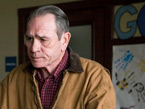
In the Valley of Elah
"In the Valley of Elah," the latest work from Paul Haggis (screenwriter for "Million Dollar Baby" and "Letters from Iwo Jima," writer/director of the Oscar-winning Crash) has made his finest film to date—as both a writer and a director. He's written a script with no wasted words or scenes and has elicited remarkable performances from everyone in the cast, particularly Tommy Lee Jones as Vietnam veteran Hank Deerfield who now hauls gravel for a living in Tennessee where he lives with his wife, played by Susan Sarandon.
They've lost one son in military combat already and, when the story begins, have just gotten a call that their other son, Mike, just back from a stint in Iraq, has gone AWOL. Without missing a beat, Hank gets in his truck and heads to Ft. Rudd, New Mexico, where Mike was stationed—and where he himself served as an M.P. during his military duty. There he discovers that his son has been murdered, dismembered and burned.
The rest of the film shows Hank's attempts to find out what happened, in which he's aided by a local detective, played by Charlize Theron, and hindered by the military investigator, played by Jason Patric. The film is remarkable for its subtlety: there's no overacting, unnecessary special effects or sequences which don't contribute to the narrative momentum. And while the war in Iraq is at the heart of what ultimately has happened to Hank's son, the only direct references we get to this conflict are crude, fuzzy images from Mike's cell phone which had been fried in the desert heat and which a technician slowly unscrambles.
But images aren't needed to serve as an indictment of the war since what happened to Mike—and his army buddies—is clear from their behavior once back on the base. In addition to Tommy Le Jones, Sarandon and Theron also give impressive performances. The phone conversation between Jones and Sarandon, where he has to tell her what happened to their son, is an Oscar-worthy moment in and of it itself. And Theron, looking as plain and unglamorous as she can, is convincing as the only female on the force in this backcountry town where she gets no respect from her co-workers.
Indeed, gender issues arise with a small sub-plot, about a hysterical woman who comes to the station when her husband kills her dog. I thought this was a bit superfluous at the time—though it does show the kind of cases the department throws Theron's way. But this event returns later—as Chekov said all details in a story should—to have significance later in the film, as do all of the details Haggis provides us, like the flag hung upside down in one of the opening frames. Nothing, in short, doesn't belong here; rather, this impressive film unfolds in a most deliberate, thoughtful manner, much like Hank Deerfield's search for the terribly sad truth about what happened to his son.
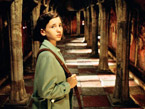
Pan's Labyrinth
The story of a 12-year old girl, Ofelia (played by newcomer Ivana Baquero), who travels with her pregnant mother Carmen (Ariadna Gil) to live with Carmen's new husband, the sadistic fascist Captain Vidal (Sergei Lopez) who brutally hunts down and kills the resistance fighters hiding in the woods outside his headquarters in rural Spain in 1944. These woods also inspire the fantasies which take Ofelia out of her bleak reality and into the labyrinth where a faun (perhaps the mythic Pan)—and his very convincing fairies—offers her an alternate reality, as long as she can complete the three tasks he gives her. These involve entering a dark fairy tale world where, among other creatures, she encounters the Pale Man—a spooky specter who can only see when he attaches his blood-red eyeballs to his elongated hands, and a monstrous toad who threatens her with his enormous tongue.
What's most impressive about this film by Mexican director Guillermo del Toro ("Cronos," "Hellboy," "Blade II") is how real both of these worlds appear and how effectively the film is structured to juxtapose them—Vidal's unrelenting violence, grounded in unremitting evil vs. Ofelia's dark fantasies, the result of her most fertile imagination.
It's one of the most complete films I've seen in a long time, with every detail—from the haunting seven-note musical motif to the visualization of the fairy tale creatures to the performances of each of the actors (who also include Maribel Verdu from "Yu Tu Mama Tambien" as Vidal's housekeeper and Ofeilia's surrogate mother)—carefully imagined and beautifully rendered on screen. I left the theater with my faith in the power of film renewed. No wonder it has been recognized with six Oscar nominations.
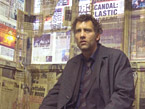
Children of Men
The time is 2027 and the place is a dystopian United Kingdom after the collapse of much of the rest of the world. As the film opens the youngest human being—18 years old—has just died. For reasons which aren't fully explained, all women have been infertile for the past 18 years—until London peace activist Theo Faron (Clive Owen) and his ex-wife Julian (Julianne Moore) discover a woman from Fuji named Kee (Clare Hope-Ashitey) who has miraculously become pregnant. They set out on a perilous journey to take her to an organization called The Human Project so that she might give birth and thus prevent the seemingly inevitable extinction of the human race.
Aiding them on their perilous journey is Michael Caine's long-haired aging hippie drug dealer Jasper, while threatening their plans is Chiwetel Ejiofor's Luke, part of Julian's revolutionary Fishes (as they're called) who turns out to be untrustworthy. The portrait of the world—or what's left of it—in 2027 is an Orwellian nightmare—with echoes of our own dangerous behaviors taken to their most frightening conclusions as nationalist Homeland Security forces round up illegal aliens or suspected terrorists and put them in cages—or worse; where civil war and its attendant violence has broken out ubiquitously; where the very survival of the world itself is at great risk (in one scene, we see Michelangelo's famous David, relocated to London, but with half of his left leg missing, a metaphor, perhaps, for the decline and fall of western civilization).
P.D. James, whose novel the film is based on, says she wrote it to answer the question, “If there were no future, how would we behave?” The answer, provided in this thought-provoking film by Mexican director Alfonso Cuaron (Harry Potter and the Prisoner of Azkaban and Y Tu Mama Tambien), is, in a word, horrifically. The brilliance of the film is not only the visual look of this not-so-distant future (think a less sci-fi version of Blade Runner), but the haunting possibility that the world it depicts is not so very different from our own, as it comments on such contemporary issues as terrorism, racism, governmental power escalating out of control, and an environment—both the man-made and the natural—on the verge of collapse.
The story itself is compelling because it is so relentless, and I was on the edge of my seat for most of the film. This is underscored by the brilliant cinematography of Emmanuel Lubezki who shot the entire film with a hand-held camera mostly in natural lighting, so that it feels more like a documentary—or a cautionary tale—than a work of fiction.
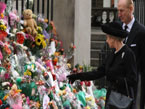
The Queen
Set during the week following the death of Princess Diana, The Queen examines the royal family's response to this national tragedy-or, as it turns out, their refusal to respond, which nearly leads to an unexpected crisis in the monarchy. At the center of this maelstrom is Queen Elizabeth II, brilliantly portrayed by Helen Mirren in a performance so convincing that from the outset you'd swear you were watching a documentary filmed inside the Windsor's private quarters. It is these inside, behind-the-scenes glimpses into the life of the royals which make this film so fascinating: the condescension of the Queen Mother, the callousness of Prince Philip, the pain of Prince Charles, and, most significantly, the growing personal conflict within Elizabeth as to what her duty in this matter should be. She favors her usual attitude of dignified restraint, initially refusing to make any public statement or return to London from her country estate.
Meanwhile Tony Blair, the newly installed prime minister (effectively played by Michael Sheen), insists that she do something. As director Stephen Frears explores the growing tension between the populist Blair, who earns instant public favor when he calls Diana "the people's princess," and a seemingly cold, callous monarch hiding behind her regal trappings, he's in familiar territory, having effectively examined the British class system in such films as My Beautiful Launderette, Dirty Pretty Things, and Mrs. Henderson Presents. Look for Helen Mirren to be on the short list for Best Actress honors come award season.
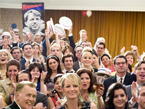
Bobby
A film in the tradition of Grand Hotel, Bobby explores the lives of 22 different people who find themselves at the Ambassador Hotel in Los Angeles on June 4, 1968, when Robert F. Kennedy arrived to celebrate his victory in the California primary, one which would have no doubt propelled him to the democratic nomination for president had it not been for the assassin who waited in the hotel's kitchen and gunned him down after his speech. The film doesn't get to the title character, however, until near the end-with the exception of the documentary footage and speeches by the senator which are woven throughout the story.
Instead, the focus is on the myriad other characters whose lives eventually connect here, a la Crash or 21 Grams. They range from Anthony Hopkins' former hotel doorman to the current manager, played by William H. Macy, who is trying to figure out how he can maintain his relationships with both his wife (a hotel hairdresser played by Sharon Stone) and his mistress (telephone operator Heather Graham). Lawrence Fishburn and Freddie Rodriquez play kitchen workers who bond over that night's L.A. Dodgers' game when ace pitcher Don Drysdale has the chance to pitch a record sixth straight shutout. Lindsay Lohan plays a compassionate young woman who marries Elijah Wood's character in an effort to keep him out of the Vietnam War, while Helen Hunt and Martin Sheen are a well-heeled couple in town to attend the Kennedy celebration. Although its intentions may, finally, be grander than its results, since there are simply too many story lines to keep track of, first-time director Emilio Estevez (who also plays the husband of Demi Moore's alcoholic lounge singer) is to be commended for presenting us with a unique perspective on this tragic event.
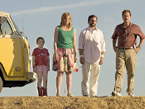
Little Miss Sunshine
Directed by Jonathon Dayton and Valerie Faris (who have worked together before, mostly on music videos). A dysfunctional family takes a road trip from New Mexico to California so that the youngest member—Olive—can be in the Little Miss Sunshine Beauty Pageant. It's a trip in which we see all their various issues come to the forefront, but also witness some hilarious and poignant moments of family bonding. The cast is terrific, starting with little Abigail Breslin as Olive—with huge glasses, her looks are a far cry from Jon Benet Ramsey or any other stereotyped would-be beauty queen but, as her grandfather—the drug-addicted Alan Arkin points out, her inner beauty is remarkable. Her dad, Richard (Greg Kinnear) is a failed motivational speaker whose marriage to Sheryl (Toni Collette) is clearly in jeopardy. Their other child—a teenager played by Paul Dano, is devoted to the philosophy of Nietzsche and has taken a vow of silence. Uncle Frank (Steve Carrel)—a leading Proust scholar—is also with the family since he's just attempted suicide after being jilted by a male graduate student and someone needs to keep an eye on him. This road trip takes a number of unexpected turns, with the climactic scene at the beauty pageant one of the best moments in film from this past summer.
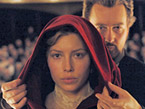
The Illusionist
The second film from writer/director Neil Burger (who previously did “Interview with the Assassin,” about the JFK murder). In his latest historical work, Edward Norton plays the title character, a magician who uses his powers—and his charm—to win the love of a woman who is engaged to marry the Crown Prince of Austria, in turn of the century Vienna. As with the other recent film about magicians, “The Prestige,” this one incorporates deception and sleight-of-hand both on and off stage, drawing the viewer into a world where you begin to question what's real and what's not. Its pace is decidedly unhurried, especially through the initial sequences, but it draws the viewer into its world and delivers a surprising—and satisfying—resolution at the end. Norton excels in this period piece which also stars Paul Giamatti as the chief police inspector; Jessica Biel (most recently of “Elizabethtown”) as the love interest, and Rufus Sewell as the Crown Prince.
--
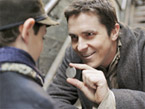
The Prestige
Christopher Nolan, director of Memento, his celebrated work which starts at the end and runs backwards, is at is again. This time the subject is dueling magicians (played by Hugh Jackman and Christian Bale) in Victorian England, who are professional and personal rivals throughout the course of the story. Bale's character is the more accomplished magician while Jackman's character is the better showman. They were both tutored by an aging master of illusion played by Michael Caine who, in the opening scene, explains the three-act structure of a magic act: the Pledge, which sets things up; the Turn, which complicates the trick; and the Prestige, which delivers the cinematic payoff. As with “Memento,” “The Prestige” (which Nolan co-wrote with his brother Jonathan) is filled with myriad plots twists, flashbacks within flashbacks, changing points of view, unexpected disguises and surprising deceptions, all of which are in keeping with the overall theme—and rivalry—at the heart of this intriguing film. An added treat is seeing singer David Bowie as the historical figure Nikola Tessla (himself a rival of Thomas Edison) who is instrumental in creating one of the illusions involving electricity which the magicians try to master, and Andy Serkis (Golllum from”Lord of the Rings”) as his assistant.

The Last Kiss
Directed by Tony Goldwyn (best known for his work on TV's Grey's Anatomy and Law & Order), Zach Braff and his group of 29-year old buddies are all afraid of commitment, a situation especially troubling to Braff's character whose fiancé, played by Jacinda Barrett, is pregnant. When the beautiful college student played by Rachel Bilson (from The O.C.) shows an interest in him, he questions his engagement, propelling the film from comic hi-jinks to dramatic tension. In addressing more serious relationship issues than most romantic scripts confront, the film reflects its cinematic heritage, based as it is on the Italian movie “L'ultimo bacio,” and written by Oscar winner Paul Haggis (“Million Dollar Baby,” “Crash”). Also adding gravitas to the film are the performances of Tom Wilkinson and Blythe Danner, who play Barrett's parents and find themselves in a mid-life marriage crisis of their own.

The Last King of Scotland
The first feature film by documentary filmmaker Kevin Macdonald who won an Oscar for “Touching the Void, this is the story of Uganda's dictator Idi Amin, brilliantly played by Forest Whitaker who's able to reflect Amin's charm and sweetness on the one hand and his power-mad penchant for violence and revenge on the other. An epic film which shifts, quite successfully, in tone as it unfolds, the story is seen through the eyes of a young Scottish doctor, played by James McAvoy (last seen as Tumnus, the satyr, in “Chronicles of Narnia”). He becomes Amin's personal physician and confidante and undergoes a crisis of conscience that recalled for me Brando's dilemma in “On the Waterfront”. Look for Whitaker to be among the best actor nominees for this remarkable performance come Oscar time; the film itself may well garner serious consideration for the top prize as well.
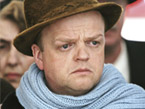
Infamous
A second Truman Capote biography, covering the exact same period as did last year's Oscar-winning Capote, yet a film I found quite riveting, perhaps because I already knew the story so that I could focus more fully on other details and gain an even fuller understanding of how writing about this Kansas murder and the killers who pulled it off changed Capote's life forever. The performances by an all-star cast are most impressive, with English actor Toby James as Capote—a dead ringer for the In Cold Blood writer, Daniel Craig (the new James Bond in “Casino Royale”) as a more conflicted Perry Smith than we got in Capote, and Sandra Bullock as a very convincing Harper Lee. Sigourney Weaver, Hope Davis and Peter Bogdonovich play some of Capote's high society friends, and Gwyenth Paltrow sets the film's mood (and suggests its central theme) with her opening torch song—“What is This Thing Called Love?”—that simply bowled me over. Douglas McGrath (“Emma” and “Nicholas Nickleby”) directed.
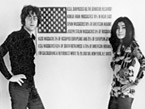
The U.S. vs. John Lennon
A portrait of the artist as a peace activist, this documentary by David Leaf and John Scheinfeld presents a very human portrait of the ex-Beatle whose anti-war activities eventually got him a place on Nixon's Enemies List, making him the subject of FBI surveillance. Filled with documentary footage from the sixties and seventies—and with contemporary interviews with a wide range of commentators, from Walter Cronkite, Angela Davis and Ron Kovic to George McGovern, Gore Vidal and G. Gordon Liddy—the film suggests both the hopeful possibilities of that tumultuous time and the tragic realities which ensued. The soundtrack is comprised exclusively of Lennon tracks—both well-known classics and some which were new to me. It's a very moving film which reveals a side of the musical genius many may not be familiar with.
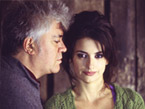
Volver
The latest film by Spanish director Pedro Almodovar (“Bad Education,” “Talk to Her,” “All About My Mother”) stars Penelope Cruz as a woman trying to hold lots of things together—as wife, mother, sister, daughter and niece. While as stunning as she's ever been on the screen, Cruz's role in what may be Almodovar's finest film yet also gives her a depth of character which is at the center of the story, a narrative which improbably but successfully combines soap opera melodramatics with film noir overtones and a very convincing ghost story. Her performance is simply riveting and the story, as is usually the case with Almodovar, takes many unexpected twists and turns as it explores relationships between the various women, all of whom are connected with Cruz's central character.



